Bacteriophage transfer during faecal microbiota transplantation in Clostridium difficile infection is associated with treatment outcome
- PMID: 28539351
- PMCID: PMC5868238
- DOI: 10.1136/gutjnl-2017-313952
Bacteriophage transfer during faecal microbiota transplantation in Clostridium difficile infection is associated with treatment outcome
Abstract
Objective: Faecal microbiota transplantation (FMT) is effective for the treatment of recurrent Clostridium difficile infection (CDI). Studies have shown bacterial colonisation after FMT, but data on viral alterations in CDI are scarce. We investigated enteric virome alterations in CDI and the association between viral transfer and clinical outcome in patients with CDI.
Design: Ultra-deep metagenomic sequencing of virus-like particle preparations and bacterial 16S rRNA sequencing were performed on stool samples from 24 subjects with CDI and 20 healthy controls. We longitudinally assessed the virome and bacterial microbiome changes in nine CDI subjects treated with FMT and five treated with vancomycin. Enteric virome alterations were assessed in association with treatment response.
Results: Subjects with CDI demonstrated a significantly higher abundance of bacteriophage Caudovirales and a lower Caudovirales diversity, richness and evenness compared with healthy household controls. Significant correlations were observed between bacterial families Proteobacteria, Actinobacteria and Caudovirales taxa in CDI. FMT treatment resulted in a significant decrease in the abundance of Caudovirales in CDI. Cure after FMT was observed when donor-derived Caudovirales contigs occupied a larger fraction of the enteric virome in the recipients (p=0.024). In treatment responders, FMT was associated with alterations in the virome and the bacterial microbiome, while vancomycin treatment led to alterations in the bacterial community alone.
Conclusions: In a preliminary study, CDI is characterised by enteric virome dysbiosis. Treatment response in FMT was associated with a high colonisation level of donor-derived Caudovirales taxa in the recipient. Caudovirales bacteriophages may play a role in the efficacy of FMT in CDI.
Trial registration number: NCT02570477.
Keywords: BACTERIAL INFECTION; MUCOSAL INFECTION.
Published by the BMJ Publishing Group Limited. For permission to use (where not already granted under a licence) please go to http://www.bmj.com/company/products-services/rights-and-licensing/.
Conflict of interest statement
Competing interests: None declared.
Figures
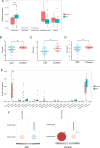
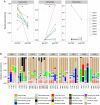
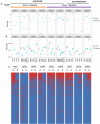
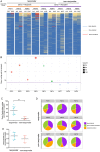
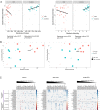
Comment in
-
Therapy: Bacteriophages important for FMT efficacy.Nat Rev Gastroenterol Hepatol. 2017 Jul;14(7):386. doi: 10.1038/nrgastro.2017.83. Epub 2017 Jun 14. Nat Rev Gastroenterol Hepatol. 2017. PMID: 28611478 No abstract available.
-
Low eukaryotic viral richness is associated with faecal microbiota transplantation success in patients with UC.Gut. 2018 Aug;67(8):1558-1559. doi: 10.1136/gutjnl-2017-315281. Epub 2017 Oct 24. Gut. 2018. PMID: 29066574 Free PMC article. No abstract available.
-
Commentary: Bacteriophage transfer during faecal microbiota transplantation in Clostridium difficile infection is associated with treatment outcome.Front Cell Infect Microbiol. 2018 Apr 4;8:104. doi: 10.3389/fcimb.2018.00104. eCollection 2018. Front Cell Infect Microbiol. 2018. PMID: 29670863 Free PMC article. No abstract available.
-
Fifty years of faecal microbiota transplant in Central Australia.Gut. 2019 Aug;68(8):1536. doi: 10.1136/gutjnl-2018-317235. Epub 2018 Aug 20. Gut. 2019. PMID: 30126889 No abstract available.
References
-
- Lee CH, Steiner T, Petrof EO, et al. . Frozen vs fresh fecal microbiota transplantation and clinical resolution of diarrhea in patients with recurrent clostridium difficile infection a randomized clinical trial. Jama-J Am Med Assoc 2016;315:142–9. - PubMed
Publication types
MeSH terms
Substances
Associated data
LinkOut - more resources
Full Text Sources
Other Literature Sources
Medical
